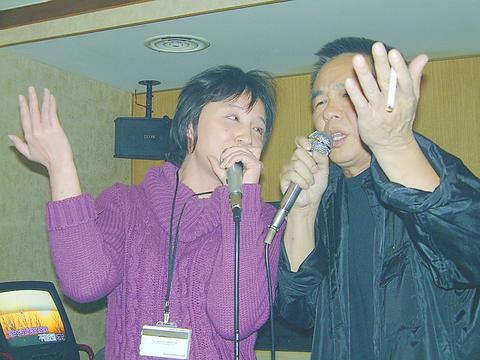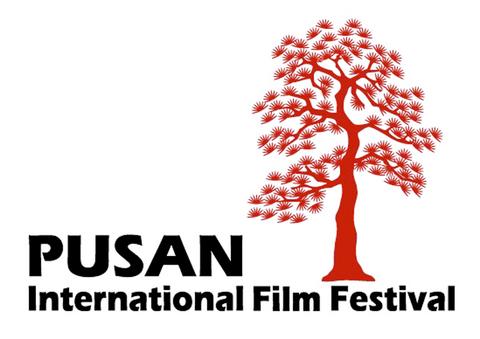Taiwanese director Hou Hsiao-hsien (
As always, Hou wore a pair of white shoes (similar to those worn by gangster types in southern Taiwan) and a simple black jacket when walking around the market streets of the Nam-po Dong area. "We know the place well enough to know which stall sells the best fish cakes," Hou told journalists from Taiwan before he dug into another fish cake.
After Millennium Mambo in 2001, which was a disappointment both critically and at the box office, Hou has taken the year off from making movies. But this doesn't mean that he has stopped working. The past year has seen him establish the Association of Taiwan Film Culture (

PHOTO: TAIPEI TIMES
If anyone asks Hou what he's been doing lately, he always has the same answer "I've been fulfilling my obligations to society," says the 55 year-old filmmaker, who, after winning many awards in Taiwan, has worked tirelessly to promote Taiwanese cinema.
On the set, Hou is famous his demanding nature and use of explicatives. But these days, despite his tight schedule, he seems to be in a much more relaxed mood. He demonstrated particular enthusiasm when asked about SPOT-Taipei by Korean journalists.
"It's like you married a nice woman and you bought a house. So you want to buy this and that and invite people to see it. You begin to have tons of new ideas to make this house a warm, creative and fun place," Hou said, adding that he will invite Kim and other Korean filmmakers over to his SPOT-Taipei for a drink .

On and off the set, Hou always plays the role of a big brother or leader. His Association of Taiwan Film Culture co-organized Taiwan Night on Nov. 19 at the Paradise Hotel in Busan with Taiwan's Governmet Information Office. Hou was seen walking around the ballroom encouraging his guests: "Eat! Eat more!" He was also looking after the younger directors from Taiwan. "Do you use 35mm? You would save more money if you did."
Later at the party, Hou was seen shouting around the ballroom again for the 11 Taiwanese directors to take a photo together. "Tsai Ming-liang! Where are you? Come on, we're taking a picture together. Hurry up now, Chen Kuo-fu (
This presents an interesting contrast to the time 20 years ago when Hou Hsiao-hsien and Edward Yang were leading the Taiwanese New Wave. There was a similar photo of 10 directors (Yang, Hou and Wu Nien-chen among others) standing together. Now, celebrating the two decades of New Taiwan Cinema, Hou is gathering young Taiwanese directors together again.
Audiences and film professionals here in Korea paid their respects to Hou, inviting him to many speeches and talks. But for Hou, his most enjoyable times in the port city where when he was sitting on a corner by the seaside, watching old Korean men play dice, or during karaoke, mimicking the Korean language and joking about his childhood dream of becoming a singer.
This may be one of the few chances for Hou to have fun and let loose. Starting next year he will be shooting his Pusan Promotional Plan-winning project The Best of Our Times (

The canonical shot of an East Asian city is a night skyline studded with towering apartment and office buildings, bright with neon and plastic signage, a landscape of energy and modernity. Another classic image is the same city seen from above, in which identical apartment towers march across the city, spilling out over nearby geography, like stylized soldiers colonizing new territory in a board game. Densely populated dynamic conurbations of money, technological innovation and convenience, it is hard to see the cities of East Asia as what they truly are: necropolises. Why is this? The East Asian development model, with

June 16 to June 22 The following flyer appeared on the streets of Hsinchu on June 12, 1895: “Taipei has already fallen to the Japanese barbarians, who have brought great misery to our land and people. We heard that the Japanese occupiers will tax our gardens, our houses, our bodies, and even our chickens, dogs, cows and pigs. They wear their hair wild, carve their teeth, tattoo their foreheads, wear strange clothes and speak a strange language. How can we be ruled by such people?” Posted by civilian militia leader Wu Tang-hsing (吳湯興), it was a call to arms to retake

This is a deeply unsettling period in Taiwan. Uncertainties are everywhere while everyone waits for a small army of other shoes to drop on nearly every front. During challenging times, interesting political changes can happen, yet all three major political parties are beset with scandals, strife and self-inflicted wounds. As the ruling party, the Democratic Progressive Party (DPP) is held accountable for not only the challenges to the party, but also the nation. Taiwan is geopolitically and economically under threat. Domestically, the administration is under siege by the opposition-controlled legislature and growing discontent with what opponents characterize as arrogant, autocratic

Desperate dads meet in car parks to exchange packets; exhausted parents slip it into their kids’ drinks; families wait months for prescriptions buy it “off label.” But is it worth the risk? “The first time I gave him a gummy, I thought, ‘Oh my God, have I killed him?’ He just passed out in front of the TV. That never happens.” Jen remembers giving her son, David, six, melatonin to help him sleep. She got them from a friend, a pediatrician who gave them to her own child. “It was sort of hilarious. She had half a tub of gummies,